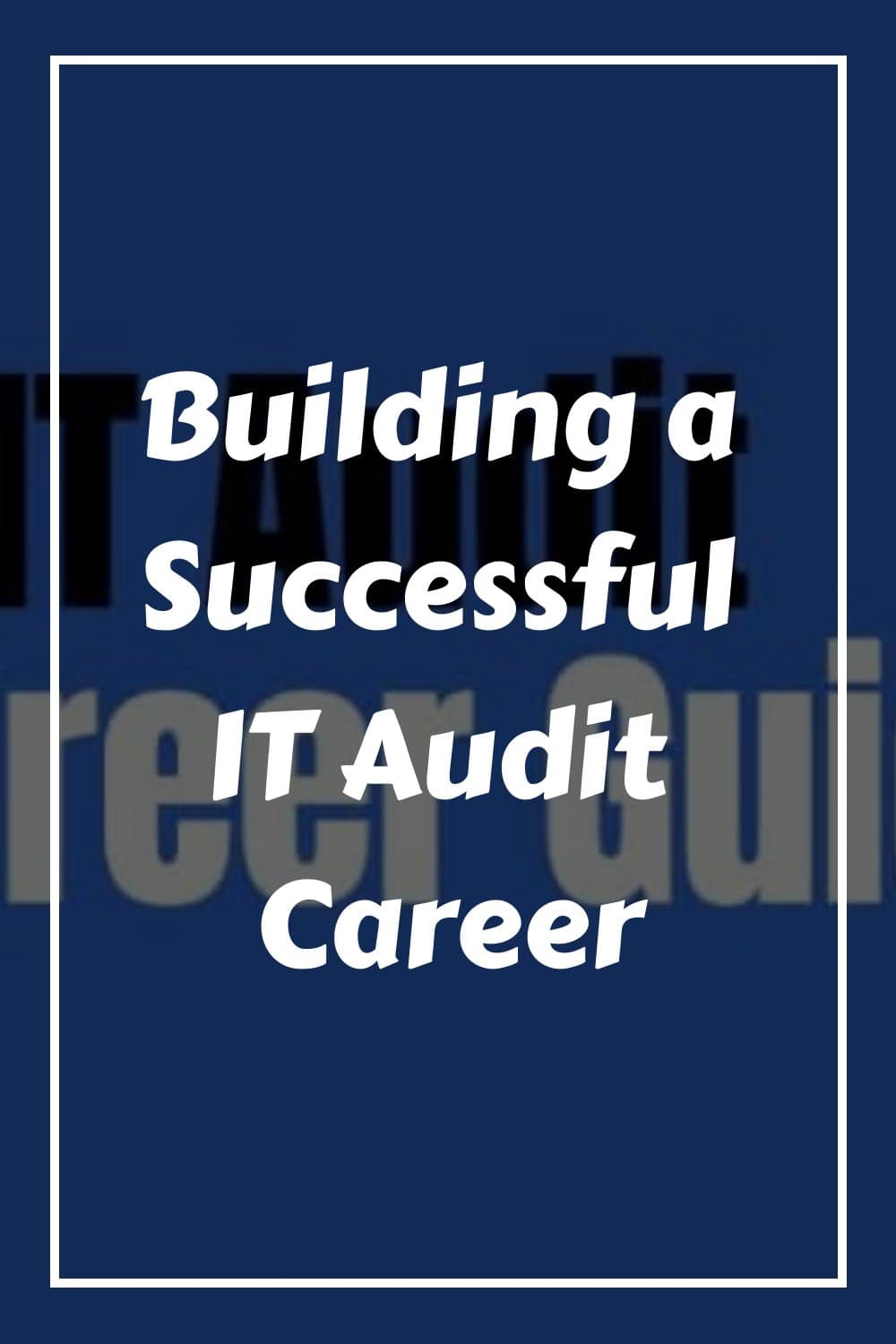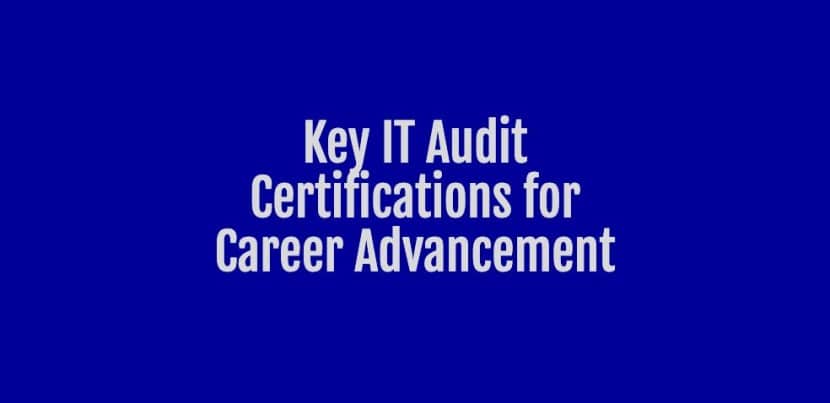Building a Successful IT Audit Career
Embarking on a career in IT audit is an exciting journey that offers numerous opportunities for professional growth, skill development, and making a significant impact within organizations. As digital transformation accelerates across industries, the demand for skilled IT auditors has never been higher. These professionals play a critical role in ensuring that an organization’s technology systems are secure, compliant, and aligned with business objectives. Whether you’re a recent graduate looking to enter the field or an experienced professional aiming to transition into IT audit, understanding the landscape, acquiring the necessary skills, and navigating your career path are essential steps towards success. In this blog post, we will explore the foundations of building a successful career in IT audit, from the essential skills and certifications to the strategies for overcoming challenges and seizing opportunities in this dynamic field.
IT Audit Career Path
In today’s digital age, IT audit has become increasingly important. With the rapid advancement of technology and the increasing reliance of organizations on digital systems, the need for skilled IT auditors has never been greater. For those interested in pursuing a career in this field, understanding the journey of an IT audit career path is essential. In this article, we will explore the various aspects of an IT audit career path, including the role of an IT auditor, the educational pathway, entry-level positions, career progression, the future of IT audit, and maintaining a work-life balance.
Understanding the Role of an IT Auditor
At its core, the role of an IT auditor is to identify, assess, and manage risk within an organization’s IT systems. IT auditors are responsible for evaluating the effectiveness, efficiency, and security of an organization’s IT systems and processes. They play a crucial role in ensuring that an organization’s IT infrastructure is aligned with its overall goals and objectives.
The key responsibilities of an IT auditor can vary depending on the organization and industry. However, some common responsibilities include:
Key Responsibilities of an IT Auditor
- Conducting risk assessments and identifying potential vulnerabilities in IT systems.
- Evaluating the effectiveness of internal controls and making recommendations for improvement.
- Auditing IT processes and procedures to ensure compliance with industry standards and regulations.
- Assessing the reliability and accuracy of financial and operational data.
- Providing recommendations for IT risk mitigation strategies.
To excel in this role, IT auditors must possess various skills and knowledge.
Required Skills and Knowledge for IT Auditors
IT auditors must have a solid understanding of IT systems and business processes. Some of the key skills and knowledge required for a successful career in IT audit include:
- Strong analytical and problem-solving skills.
- Knowledge of relevant industry standards and regulations.
- Expertise in IT governance, risk management, and control frameworks.
- Excellent communication and interpersonal skills.
- Attention to detail and the ability to think critically.
Furthermore, IT auditors must stay current with technological advancements and industry trends. This includes understanding emerging technologies such as cloud computing, artificial intelligence, and blockchain, and how they impact an organization’s IT infrastructure. By keeping abreast of these developments, IT auditors can better assess the risks and opportunities associated with implementing new technologies.
In addition to technical skills, IT auditors must also possess strong business acumen. They must understand the organization’s strategic objectives, business processes, and industry-specific challenges. This knowledge allows IT auditors to align their audits with the organization’s goals and identify areas where IT systems can contribute to overall business success.
Collaboration and teamwork are also essential skills for IT auditors. They often work closely with other departments, such as IT, finance, and compliance, to gather information, assess risks, and implement recommendations. Effective communication and interpersonal skills are crucial in building relationships and gaining the cooperation of stakeholders throughout the audit process.
Lastly, attention to detail is paramount for IT auditors. They must meticulously review and analyze large amounts of data, identifying any anomalies or discrepancies that may indicate potential risks or control weaknesses. By paying close attention to detail, IT auditors can provide accurate and reliable assessments of an organization’s IT systems and processes.
The Educational Pathway to an IT Audit Career
Individuals should pursue relevant education and certifications to embark on a career in IT audit. While there is no specific degree required to become an IT auditor, there are certain educational pathways that can provide a solid foundation for this career.
When it comes to degree programs, there are several options that can prepare individuals for a career in IT audit. One of the most common degree programs pursued by aspiring IT auditors is a Bachelor’s degree in Computer Science or Information Systems. This program equips students with a strong technical background, enabling them to understand the intricacies of IT systems and effectively assess their security and control measures.
Another degree program that can be beneficial for aspiring IT auditors is a Bachelor’s degree in Accounting or Finance. This program provides a solid understanding of financial principles and regulations, which is essential when evaluating the financial impact of IT risks and controls. It also helps individuals develop strong analytical and problem-solving skills, which are crucial in IT audits.
For those who wish to further specialize in IT audit, pursuing a Master’s degree in IT Audit or a related field can be a great option. This advanced degree program delves deeper into the intricacies of IT audit, covering topics such as IT governance, risk management, and compliance. It provides individuals with a comprehensive understanding of the field and prepares them for more senior roles in IT audit.
In addition to formal education, obtaining certifications can greatly enhance an individual’s prospects in the IT audit field. Certifications validate an individual’s skills and knowledge in specific areas of IT audit, making them more marketable and credible to potential employers.
One of the most beneficial certifications for IT auditors is the Certified Information Systems Auditor (CISA) certification. This globally recognized certification demonstrates an individual’s expertise in auditing, controlling, and securing information systems. It covers many topics, including IT governance, risk management, and information security, making it highly valuable for IT auditors.
Another certification that can be advantageous for IT auditors is the Certified Internal Auditor (CIA) certification. This certification focuses on internal auditing practices and principles, equipping individuals with the necessary skills to assess and improve an organization’s internal control systems. It demonstrates a strong understanding of auditing standards and techniques, making it a valuable asset for IT auditors.
In addition to the CISA and CIA certifications, the Certified Information Systems Security Professional (CISSP) certification is also highly regarded in the IT audit field. This certification validates an individual’s expertise in information security, covering topics such as access control, cryptography, and network security. It demonstrates a strong understanding of security principles and practices, which is essential when evaluating the security posture of IT systems.
Lastly, the Certified in Risk and Information Systems Control (CRISC) certification can be beneficial for IT auditors. This certification focuses on risk management and control implementation, equipping individuals with the skills to identify and manage IT risks within an organization. It demonstrates a strong understanding of risk assessment methodologies and control frameworks, making it a valuable certification for IT auditors.
By pursuing relevant education and certifications, individuals can build a strong foundation for a successful career in IT audit. Whether it’s through a degree program or obtaining certifications, investing in one’s education and professional development is key to thriving in this dynamic and in-demand field.
Entry-Level Positions in IT Audit
After completing the necessary education and certifications, individuals can explore entry-level positions in IT audit. These positions provide valuable hands-on experience and an opportunity to apply theoretical knowledge practically.
Working in an entry-level IT audit position is an exciting opportunity for individuals who are passionate about technology and have a keen eye for detail. While these positions may not involve high-level decision-making, they serve as the foundation for a successful career in IT audit.
Job Descriptions and Duties
Entry-level IT audit positions typically involve working alongside experienced auditors to perform various tasks, such as:
- Assisting in the planning and execution of IT audits.
- Conducting tests to assess the effectiveness of IT controls.
- Preparing audit reports and documenting findings.
- Reviewing IT policies and procedures for compliance.
These tasks require a strong understanding of information technology systems and the ability to analyze complex data. Entry-level auditors play a crucial role in ensuring the integrity and security of an organization’s IT infrastructure.
Moreover, working alongside experienced auditors provides an excellent opportunity for learning and professional growth. Entry-level auditors can observe and learn from seasoned professionals, gaining insights into best practices and industry standards.
Tips for Landing Your First IT Audit Job
Competition for entry-level IT audit positions can be fierce. Here are some tips to increase your chances of landing your first IT audit job:
- Gain relevant experience through internships or part-time positions. Practical experience in IT audit or related fields can give you a competitive edge.
- Network with professionals in the field and attend industry events. Building connections and updating industry trends can open doors to job opportunities.
- Showcase your skills and knowledge through relevant projects or research. Employers value candidates who can demonstrate their abilities through real-world examples.
- Continuously update your skills and knowledge through professional development courses or certifications. IT audit is a rapidly evolving field, and staying up-to-date with the latest technologies and practices is essential.
By following these tips and demonstrating your passion for IT audit, you can increase your chances of securing your first entry-level position in this exciting field.
Career Progression in IT Audit
As individuals gain experience and expertise in the field of IT audit, they can progress to more senior roles and take on greater responsibilities.
Mid-level IT audit roles typically involve leading and supervising audit engagements. These roles require a strong understanding of IT systems and controls, as well as the ability to communicate with stakeholders at all levels of the organization effectively. Mid-level IT auditors are crucial in ensuring that IT systems are secure, reliable, and compliant with industry standards.
One of the key responsibilities of mid-level IT auditors is planning and executing complex IT audit projects. This involves conducting thorough assessments of IT systems and identifying potential risks and vulnerabilities. Mid-level auditors also play a vital role in managing audit teams and guiding junior auditors. By sharing their knowledge and expertise, they help develop the next generation of IT auditors.
In addition to leading audit engagements, mid-level IT auditors are also responsible for developing and implementing IT audit methodologies and frameworks. This involves staying up-to-date with the latest industry trends and best practices and adapting audit approaches accordingly. By continuously improving audit methodologies, mid-level auditors contribute to the overall effectiveness and efficiency of the IT audit function.
Furthermore, mid-level IT auditors often conduct training sessions for junior auditors. These sessions help junior auditors enhance their technical skills, understand audit processes, and develop a strong foundation in IT audit. By investing in the professional development of junior auditors, mid-level auditors contribute to the growth and success of the IT audit team as a whole.
Senior IT audit positions are considered the pinnacle of an IT audit career. Individuals in senior roles are responsible for providing strategic guidance and driving continuous improvement in IT audit processes. These positions require a deep understanding of IT risk and control issues, as well as the ability to navigate complex organizational structures.
One of the key responsibilities of senior IT auditors is developing and maintaining relationships with key stakeholders. This involves collaborating with business leaders, IT managers, and other relevant stakeholders to understand their needs and align audit objectives accordingly. By building strong relationships, senior auditors ensure that IT audit findings and recommendations are effectively communicated and acted upon.
In addition to stakeholder management, senior IT auditors oversee the planning and execution of IT audit projects. They ensure that audit engagements are conducted in accordance with industry standards and regulatory requirements. Senior auditors also provide expert advice on complex IT risk and control issues, helping organizations identify and mitigate potential threats.
Furthermore, senior IT auditors are critical in ensuring compliance with regulatory requirements. They stay abreast of changes in laws and regulations pertaining to IT systems and controls and work closely with management to ensure that necessary measures are in place. By proactively addressing compliance issues, senior auditors help organizations avoid potential penalties and reputational damage.
In conclusion, career progression in IT audit offers exciting opportunities for individuals to grow and make a significant impact. From mid-level roles involving leading and supervising audit engagements to senior positions focused on providing strategic guidance and driving continuous improvement, the field of IT audit offers a rewarding and fulfilling career path.
The Future of IT Audit
The field of IT audit is constantly evolving, driven by technological advancements and changing business needs. To stay relevant in this rapidly changing field, IT auditors need to stay informed about emerging trends and continuously update their skills and knowledge.
As technology advances at an unprecedented pace, the role of IT auditors becomes increasingly crucial. They are not only responsible for ensuring the integrity and security of an organization’s information systems but also for identifying potential risks and vulnerabilities. With the rise of cyber threats and data breaches, IT auditors must stay ahead of the curve to protect their organizations from potential disasters.
Emerging Trends in IT Audit
Some of the emerging trends in IT audit include:
- Data analytics and automation
- Cloud computing and cybersecurity
- Artificial intelligence and machine learning
- Internet of Things (IoT) and connected devices
Data analytics and automation have revolutionized how IT auditors analyze and interpret large volumes of data. With the help of advanced analytics tools and techniques, auditors can now identify patterns, anomalies, and potential risks more efficiently. This not only saves time but also enhances the accuracy and effectiveness of audits.
Cloud computing and cybersecurity have become integral parts of IT audit. As organizations increasingly rely on cloud-based systems to store and process data, auditors must ensure that these systems are secure and compliant with industry regulations. They need to assess the effectiveness of security controls, monitor access and usage, and identify any vulnerabilities that could compromise data integrity.
Artificial intelligence (AI) and machine learning (ML) transform how IT auditors perform their tasks. AI-powered tools can automate routine audit procedures, allowing auditors to focus on more complex and strategic activities. ML algorithms can analyze historical data and identify fraudulent activities or non-compliance patterns. By leveraging AI and ML, auditors can enhance the efficiency and accuracy of their audits.
The Internet of Things (IoT) and connected devices have introduced new challenges for IT auditors. With the proliferation of smart devices and interconnected systems, auditors must assess the security and privacy risks associated with these technologies. They need to ensure that proper controls are in place to protect sensitive data and prevent unauthorized access.
How to Stay Current in the IT Audit Field
To stay current in the IT audit field, IT auditors can:
- Attend industry conferences and webinars.
- Participate in professional development courses and training programs.
- Join professional organizations and networking groups.
- Read industry publications and research papers.
Industry conferences and webinars provide IT auditors with opportunities to learn from industry experts, gain insights into emerging trends, and network with peers. These events often feature presentations and panel discussions on data analytics, cybersecurity, and emerging technologies.
Professional development courses and training programs allow IT auditors to enhance their skills and knowledge in specific areas. These programs cover data analytics, cloud computing, cybersecurity, and risk management. By continuously updating their skills, auditors can stay ahead of the curve and adapt to the changing demands of the field.
Joining professional organizations and networking groups allows IT auditors to connect with like-minded professionals and share best practices. These communities provide a platform for knowledge exchange, mentorship, and collaboration. By actively participating in these groups, auditors can expand their professional network and stay informed about the latest industry developments.
Reading industry publications and research papers is another effective way for IT auditors to stay current. These sources provide in-depth analysis and insights into emerging trends, best practices, and case studies. By regularly reading industry publications, auditors can stay informed about the latest tools, techniques, and regulations that impact their work.
Balancing Work-Life in an IT Audit Career
While a career in IT audit can be rewarding, it can also be demanding and stressful. A healthy work-life balance is essential to prevent burnout and maintain long-term career satisfaction.
Managing Stress in IT Audit
IT auditors can manage stress by:
- Practicing stress management techniques such as exercise, meditation, and deep breathing.
- Setting realistic expectations and managing workload effectively.
- Seeking support from colleagues and supervisors.
- Take regular breaks and set boundaries between work and personal life.
Managing stress is crucial in the field of IT audit. The nature of the job often involves tight deadlines, complex projects, and high-pressure situations. By incorporating stress management techniques into their daily routines, IT auditors can enhance their ability to handle challenging situations effectively. Regular exercise helps reduce stress levels and improves focus and concentration. Meditation and deep breathing exercises can provide calm and mental clarity, enabling auditors to approach their work with a clear and focused mindset.
In addition to personal stress management techniques, seeking support from colleagues and supervisors can also be highly beneficial. A strong workplace support system allows IT auditors to share their concerns, seek advice, and gain different perspectives. This support network can provide a sense of camaraderie and reassurance, making the job more manageable and less overwhelming.
Achieving Work-Life Balance as an IT Auditor
To achieve work-life balance, IT auditors can:
- Set priorities and allocate time for personal activities and relationships.
- Take advantage of flexible work arrangements, such as remote work or flexible hours.
- Unplug from work during non-work hours and take regular vacations.
- Engage in hobbies and activities outside of work to recharge and relax.
Work-life balance is crucial for the overall well-being and satisfaction of IT auditors. Setting priorities and allocating time for personal activities and relationships allows auditors to feel fulfilled outside of work. Whether it’s spending quality time with family and friends, pursuing hobbies, or engaging in self-care activities, these personal endeavors contribute to a more balanced and fulfilling life.
Flexible work arrangements, such as remote work or flexible hours, can also play a significant role in achieving work-life balance. These arrangements allow auditors to structure their work schedules in a way that suits their personal needs and preferences. This flexibility allows for better work and personal life integration, reducing stress and enhancing overall well-being.
Furthermore, it is essential for IT auditors to unplug from work during non-work hours and take regular vacations. Disconnecting from work allows auditors to recharge and rejuvenate, preventing burnout and promoting mental and emotional well-being. Taking time off to relax, explore new places, or engage in leisure activities can positively impact job performance and overall job satisfaction.
By following these strategies, IT auditors can excel in their careers while maintaining a healthy work-life balance. Prioritizing stress management and work-life integration benefits the individual auditor and contributes to a more productive and harmonious work environment.
In conclusion, the journey of an IT audit career path is filled with opportunities for growth and development. From understanding the role of an IT auditor to exploring the educational pathway, entry-level positions, career progression, and the future of IT audit, individuals can chart their path in this dynamic field. By staying informed about emerging trends and maintaining a healthy work-life balance, IT auditors can navigate the challenges and achieve long-term career success.









